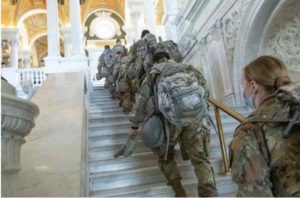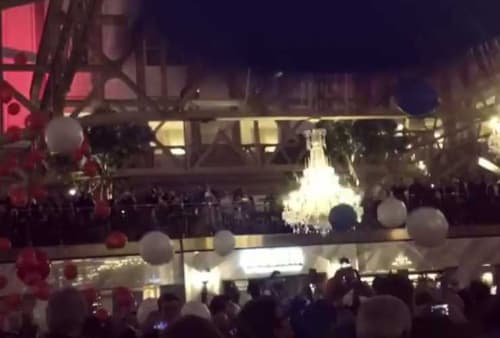
JOINT BASE ELMENDORF-RICHARDSON, Alaska — Airmen and Soldiers of the Alaska National Guard assisted the District of Columbia National Guard and federal civilian authorities with the 59th Presidential Inauguration this week, and will be headed home within the next few days.
About 70 Alaska National Guard Airmen and Soldiers joined nearly 26,000 Guard members from every state, territory, and the District of Columbia to assist with the historic event. Concerns for safety and security increased after a Jan. 6 protest at the U.S. Capitol escalated, resulting in five deaths, many injuries and arrests. A large number of protesters pushed past barricades and forcibly trespassed into the Capitol Building while Congress met to certify Electoral College votes for the 2020 Presidential election.
“We train to be ready at a moment’s notice when requested to support civil authorities,” said Maj. Gen. Torrence Saxe, adjutant general of the Alaska National Guard, and commissioner for the Alaska Department of Military and Veterans Affairs. “Those partnerships are built on trust and performance, and directly contribute to our success in domestic operations during natural disasters and emergencies.
“This showcased our ability to respond quickly with a volunteer force for a real-world mission,” said Saxe. “Our ramp-up to head out, and the experience for the 70 Airmen and Soldiers on the ground only strengthened our ability to serve Alaskans at home.”
While providing assistance in D.C., Alaska National Guard Airmen and Soldiers assisted with security, logistics, and transportation operations around the Capitol, National Mall and White House. They conducted up to 24-hour operations and implemented rest-work cycles in staging areas for safety reasons. After civilian authorities deemed it necessary, they reduced operations to 8- to 12- hour shifts. During most inaugurations, hotel rooms are full of visitors to the area who plan to attend the inauguration. Due to this year’s unique circumstances, all Alaska Guard members were assigned individual lodging in hotels.
The Joint Congressional Committee on Inaugural Ceremonies announced in December that there would be a limited number of tickets to attend the inauguration, one for each lawmaker and a guest, as contrasted with the 200,000 tickets normally available, according to open-source news. The committee reduced the number of tickets as a social distancing precaution amid the pandemic.
After the events of Jan. 6, civil authorities determined that there would need to be a larger contingent of National Guardsmen to assist with extra precautionary measures.
Alaska Airman, Capt. Jennifer Ward is a troop leader for one of Alaska’s three groups assigned with inaugural duties.
“During our duty periods, we have opportunities to take breaks while others swap out with us,” said Ward, the medical readiness officer for the 176th Wing, Alaska Air National Guard. “The day before the inauguration, we were staged in a heated parking garage for about five hours, which was great because it was only 38-degrees outside.”
“It was clean, had porta-potties, and we were able to rest and relax before going back out,” she said. “It’s important to take breaks in areas that are in close proximity to the zone we’ve been assigned so that we can respond quickly if needed, but so far that hasn’t been necessary.”
Alaska Guardsmen also staged at FedExField, a football stadium in Landover, Maryland, five miles east of Washington, D.C.; and in the Library of Congress. According to its website, the Library of Congress is the largest library in the world, with millions of books and other resources, and is the main research arm of the U.S. Congress and home of the U.S. Copyright Office.
“The library is spacious, beautiful and historic,” said Maj. Nathan Pooler, the troop commander for Alaska Guardsmen in D.C. “It takes a long time to load up and be transported back to the hotel, so it’s not feasible to leave the area during our breaks,” he said.
Members of the National Guard are equipped, trained and prepared for long shifts and uncomfortable surroundings, they remain flexible, and have a strong desire to live up to their well-known motto, “Always Ready, Always There.”
“We adapt and overcome,” said Pooler. “It’s what we do, the Soldiers and Airmen have high morale and have demonstrated a sense of greater purpose.”
Military involvement in the Presidential Inauguration dates back 232 years to when members of the U.S. Army, local militias (the modern-day National Guard), and Revolutionary War veterans escorted George Washington to New York City—the seat of government for his inauguration ceremony. The National Guard and other military units have continued this tradition of inaugural support ever since.
###








